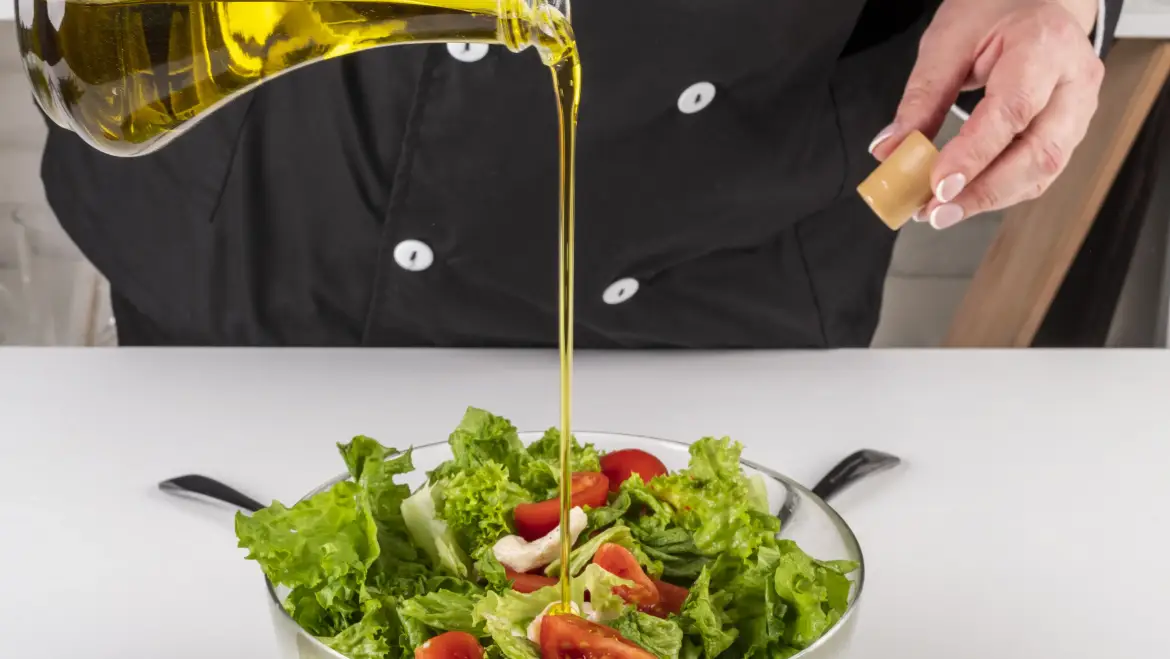Walk into any kitchen and you’ll find one ingredient at the centre of almost every meal: cooking oil. It does more than help food cook. It fuels your body, supports heart health, and contributes to overall well-being. Yet, despite its importance, many of us reach for oils out of habit or convenience, not necessarily based on what’s best for our health.
India’s culinary traditions are closely tied to regional oils. Mustard in the north, coconut in the south, ghee during festive cooking, sunflower for daily meals, and more recently, olive oil for those making more mindful choices. Each oil has its place, shaped by both culture and function. But when health becomes the priority, it’s important to ask: which edible oil supports your well-being?
Modern research and evolving diets increasingly point to olive oil as a balanced and health-focused option.
In this guide, we explore what makes an oil healthy, compare the most commonly used edible oils in Indian kitchens, and help you choose the one that best fits your lifestyle, cooking habits, and health goals.
What Makes an Oil Healthy?
If you’re wondering which edible oil is good for health, it starts with understanding what makes an oil beneficial. The right cooking oil should support your body’s nutritional needs without adding unnecessary risks. When choosing one for your kitchen, here are a few key factors to consider:
• Fat Composition:
The type of fat in your oil matters. Oils high in monounsaturated and polyunsaturated fats are generally better for heart health. On the other hand, oils with too much saturated or trans fat are best limited. Always check the label. Choosing the right fat profile can help you maintain a healthier balance in your everyday meals.
• Smoke Point:
Each oil has a smoke point, which is the temperature at which it begins to break down and lose its nutritional quality. For frying or sautéing, choose oils with a high smoke point. Lower smoke point oils work better for salad dressings or light cooking. Using the right oil for the right method helps retain both flavour and nutrition.
• Antioxidants and Nutrients:
Some oils naturally contain vitamin E, vitamin K, and polyphenols (a natural antioxidant), or omega-3s. These nutrients can give your meals an extra layer of support for overall well-being.
• Processing Method:
The way an oil is processed can impact both its quality and health value. Cold-pressed or extra virgin oils tend to preserve more of their natural nutrients and antioxidants, which is why they’re often a better fit for health-conscious choices.
Why Olive Oil Stands Out
Olive oil has steadily earned its place as a trusted choice in everyday Indian cooking. It’s naturally rich in monounsaturated fats, especially oleic acid, which is known to support heart health. It also contains powerful antioxidants such as polyphenols, which help protect the body from oxidative stress. When used regularly as part of a balanced diet, olive oil can support healthy cholesterol levels, reduce inflammation, aid cardiovascular wellness, and may even support cognitive function over time.
But its appeal isn’t just nutritional. Olive oil is incredibly versatile:
• Extra Virgin Olive Oil:
Extracted from olives using cold-press methods, without heat or chemicals. It’s full of natural flavour and best used in raw or lightly cooked dishes, such as salads, dips, dressings, or drizzling.
• Pure Olive Oil:
A refined blend that offers a milder flavour and a higher smoke point. Suitable for sautéing, roasting, or everyday cooking while still preserving the essence of olives.
• Extra Light Olive Oil:
Refined further for a lighter taste and appearance. This version retains healthy fats while making it ideal for high-heat cooking such as deep-frying, baking, or daily use where you want a neutral flavour.
Comparing Other Edible Oils
Let’s take a closer look at how other common oils compare to olive oil in terms of health, composition, and daily use.
1. Mustard Oil
A staple in many Indian kitchens, mustard oil is rich in monounsaturated fats and contains omega-3 fatty acids, which are good for heart health. It has antimicrobial properties and a strong flavour, which makes it a favourite for pickling and traditional recipes. However, it contains erucic acid, which has raised health concerns in some studies, especially with excessive consumption.
2. Sunflower Oil
Sunflower oil is commonly used for its neutral taste and high smoke point. It contains vitamin E and is low in saturated fat. However, it is often high in omega-6 fatty acids, which, in excess, can lead to inflammation if not balanced with omega-3s in the diet.
3. Coconut Oil
Coconut oil is known for its distinctive aroma and high saturated fat content. It’s popular in southern Indian cooking and has some antimicrobial properties, but its high saturated fat level makes it a controversial choice for heart health. Some newer studies suggest that moderation is key.
4. Sesame Oil
Rich in polyunsaturated fats and antioxidants, sesame oil is especially favoured in Asian and Indian cuisines. It has anti-inflammatory properties and adds a unique flavour to dishes. The cold-pressed version, also known as gingelly oil, is considered more beneficial.
5. Canola Oil
Often marketed as a heart-healthy oil due to its low saturated fat and good omega-3 content, canola oil has a neutral taste and a high smoke point. However, most canola oil is highly processed and sometimes genetically modified, which is a concern for some consumers.
6. Ghee (Clarified Butter)
While not technically an oil, ghee is a widely used fat in Indian households. It contains saturated fats and fat-soluble vitamins such as A, D, and E. Ghee is stable at high heat and adds rich flavour to food. However, like coconut oil, it should be used in moderation, especially for those managing cholesterol levels.
How to Choose the Right Cooking Oil
|
Need |
Best Oil Choice |
|
Support heart health |
Olive oil stands out for its balance of good fats and natural antioxidants. |
| Cooking at high temperatures |
Oils with a high smoke point, like sunflower, mustard, or refined olive oil, work well. |
|
Watching your cholesterol |
Choose oils low in saturated fats and rich in monounsaturated fats such as olive oil. |
| Looking for a balanced approach |
Use olive oil regularly, and rotate with locally preferred oils. |
|
Light cooking and salad dressings |
Extra virgin olive oil adds flavour without overpowering the dish. |
| Nutrient-conscious choices |
Look for oils with added benefits such as vitamin E, K, and omega-3s. Olive oil offers these naturally. |
|
Everyday cooking for the family |
Refined olive oil or sunflower oil can be used effectively for daily meals. |
| Seeking versatility |
Olive oil adapts well to various cuisines, from sautéing to baking and raw use. |
Final Thoughts
Every oil brings something valuable to the kitchen. But when it comes to long-term wellness, especially heart and metabolic health, olive oil stands out. The balanced fat profile, versatility, and well-studied health benefits of olive oil make it a smart, dependable choice for today’s Indian homes.
Still, no single oil does it all. Understanding what each one offers helps you make better choices for your meals, your family, and your overall health.
Frequently Asked Questions (FAQs)
1. Which Cooking Oil Is Best for Heart Health?
Olive oil, especially extra virgin olive oil, is considered one of the best choices for heart health. It’s rich in monounsaturated fats and antioxidants, which help support cardiovascular function and reduce inflammation.
2. Are Cold-Pressed Cooking Oils Better for Health?
Yes, cold-pressed cooking oils are generally better for health because they retain more of their natural nutrients, antioxidants, and flavour. Unlike refined oils, they aren’t exposed to high heat or chemicals during processing, making them a more wholesome choice.
3. Does Ghee Increase Cholesterol?
Ghee contains saturated fats, which can raise cholesterol levels if consumed in excess. However, in moderation, and as part of a balanced diet, it may not pose a risk for most healthy individuals.
4. Which Oil Is Best for Indian Cooking?
Mustard and sunflower oils are commonly used in Indian cooking for their flavour and high smoke points. Olive oil, especially the pure or extra light, also works well and offers health benefits, making it a smart modern alternative.
5. Can I Reuse Cooking Oil for Frying?
Reusing cooking oil is common, but it should be done with caution. Oil breaks down each time it’s heated, which can lead to harmful compounds and altered taste. If you must reuse, strain it well, store it properly, and avoid using it more than once or twice.
6. Which Oil Is Good for Cholesterol Management?
Olive oil is good for cholesterol as it’s rich in monounsaturated fats that help lower LDL (bad) cholesterol and support HDL (good) cholesterol. Its natural antioxidants, such as polyphenols, also contribute to better heart health.


